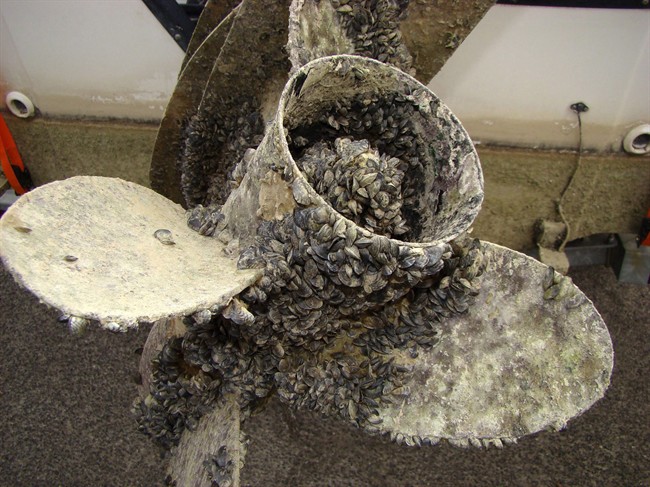Meet Kilo.

Since last year, the K9 with B.C.’s Conservation Officer Service (COS) has been sniffing out boats for invasive species that threaten salmon, ecosystems, hydro stations and other forms of infrastructure.
On Friday, the provincial government trotted him out at a news conference announcing that it was dedicating annual funding to a program aimed at protecting B.C.’s waterways.
Coverage of zebra mussels on Globalnews.ca:
Kilo was seen searching a boat for a single mussel at the news conference where B.C. Environment Minister George Heyman announced that “dedicated, significant” annual funding for the Invasive Mussel Defence Program, which is aimed at stopping zebra and quagga mussels from coming into the province.
The program receives annual funding of just under $4 million from various sources, including the Ministry of Environment and Climate Change, and BC Hydro.
“It’s imperative that we keep these destructive species out of our province and not allow them to threaten our vibrant B.C. waterways,” Heyman said in a statement.
“This is why we will be funding the Invasive Mussel Defence Program on an annual basis, to ensure that necessary and responsive resources are in place to protect our economy, our infrastructure and our sensitive ecosystems.”
READ MORE: Zebra mussels invasion of Victoria Beach ‘normal’: specialist
Zebra and quagga mussels are species that aren’t native to North America.
They first arrived in Canada and the U.S. from the Baltic Sea via trans-continental shipping in the 1980s.
They have since been found in Manitoba’s Lake Winnipeg, as well as Ontario and Quebec.
They’re dangerous for ecosystems because they affect aquatic food webs and potentially harm fish species such as Sockeye salmon.
The mussels are also known to block pipes and municipal water supplies.

Quagga and zebra mussels can be transferred to different bodies of water when they’re attached to boats and marine equipment.
They also contain “free-swimming larvae” that can survive in boats for several weeks.
B.C. tackles the mussels through a system of 12 inspection stations where officials determine whether vessels could be carrying the mussels.
The B.C. Conservation Officer Service leads efforts at those stations.
READ MORE: Manitoba community takes zebra mussel fight into their own hands as province fails to issue fines
Kilo conducted over 900 inspections in his first year and found invasive mussels on two vessels.
Next year, K9 Major will become the program’s second canine officer.
Anyone who spots vessels that may contain invasive mussels is encouraged to contact the B.C. Conservation Officer Service’s Report All Poachers and Polluters (RAPP) hotline at 1-877-952-7277.








Comments